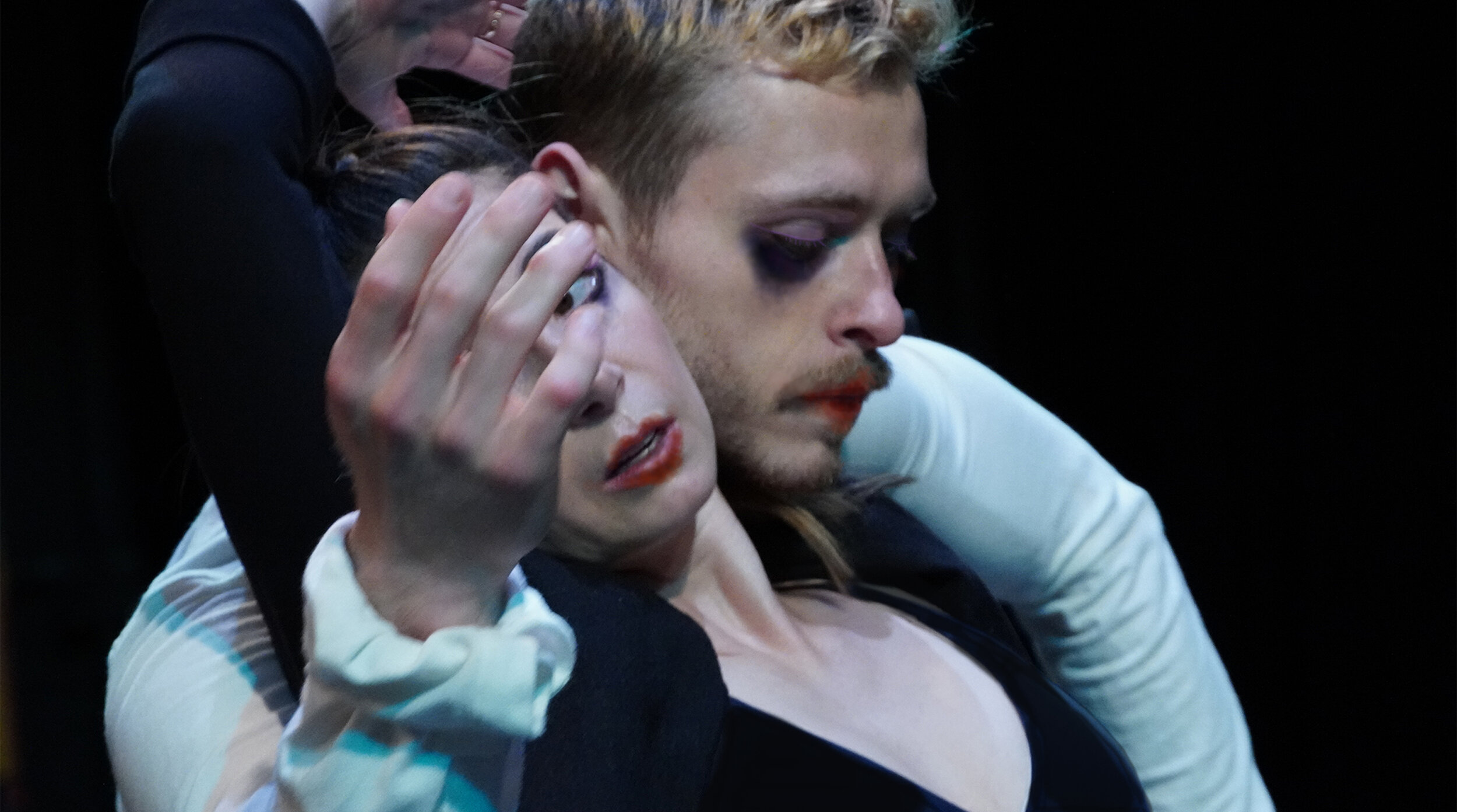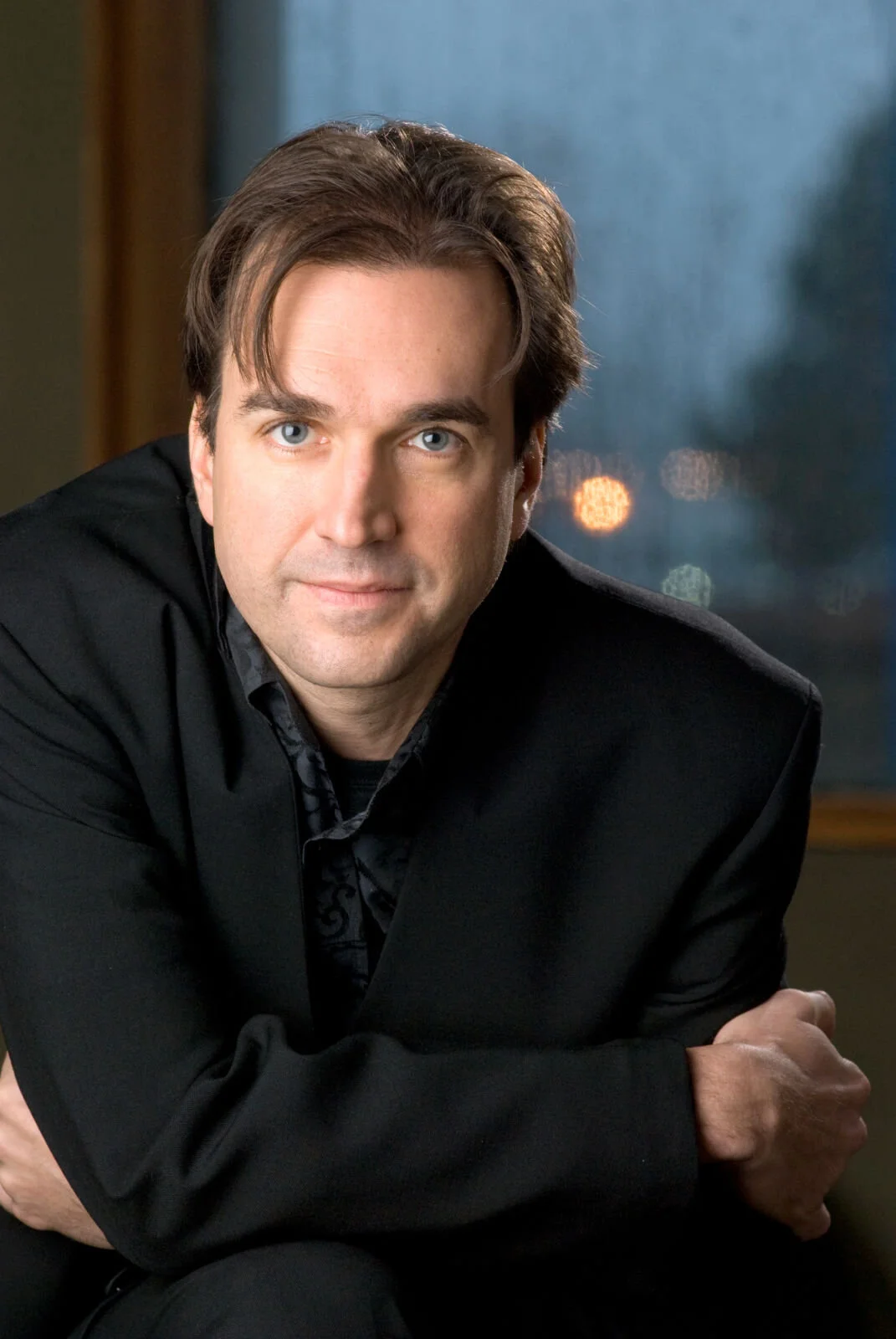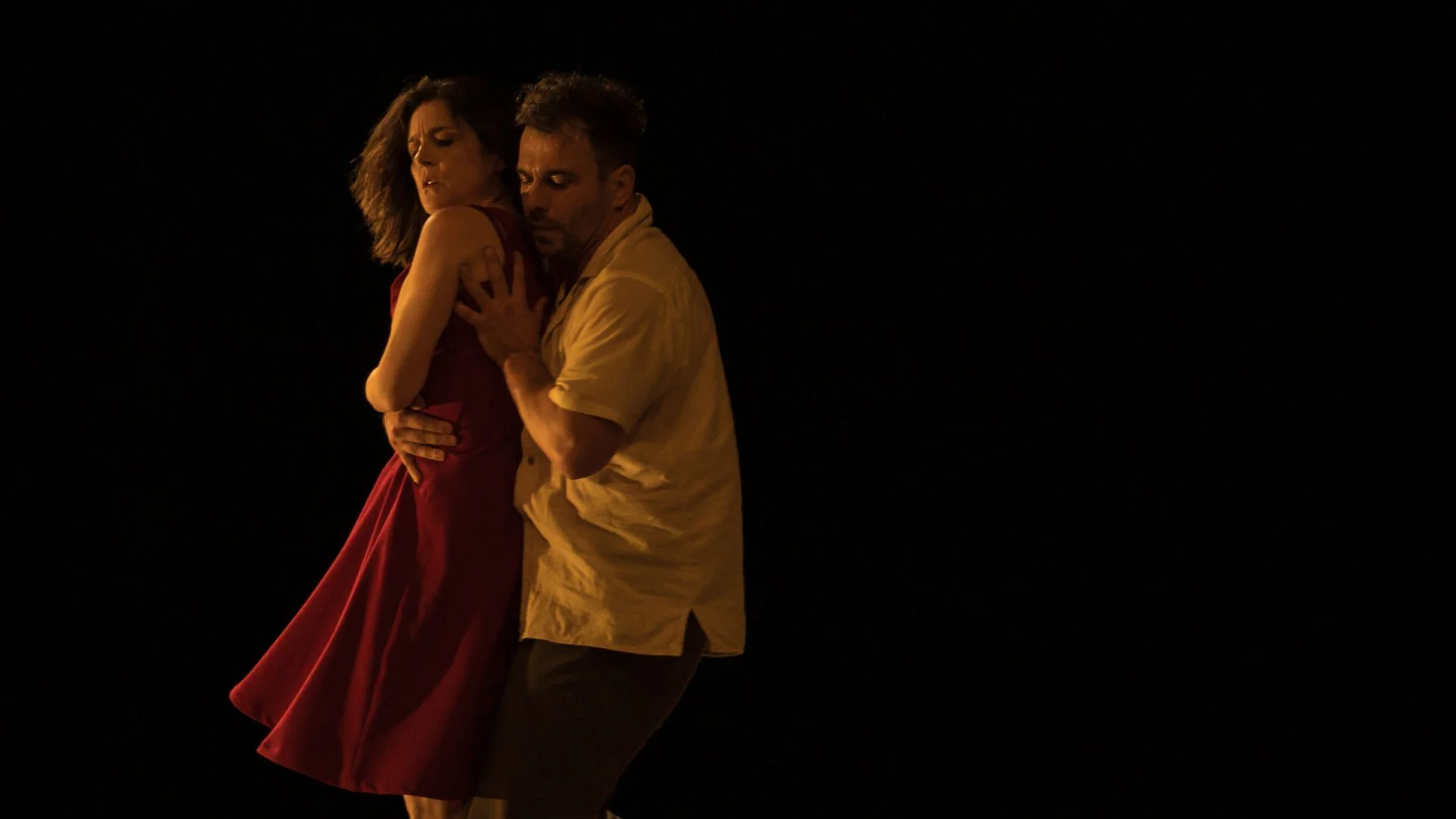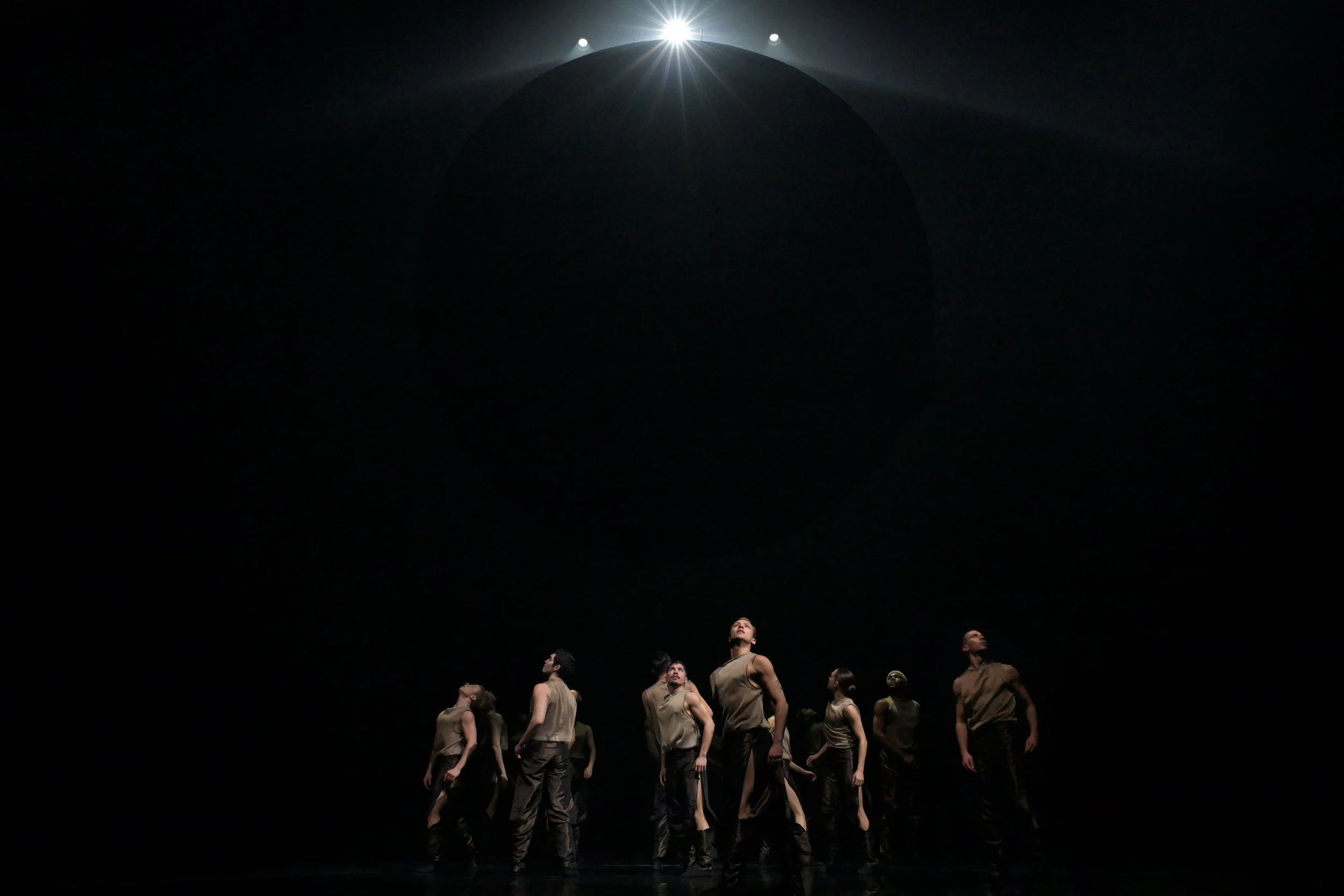Ne. Sans opera and dance's Idan Cohen further finds his creative voice in Vancouver
At the Chutzpah! Festival, his Hourglass blends Philip Glass, visual storytelling, and movement
Brandon Lee Alley and Racheal Prince in Hourglass. Photo by Theo Bell
The Chutzpah! Festival presents Hourglass via livestream on November 25 at 7 pm
FOR MORE THAN TWO decades, Israel has been one of the world’s hotbeds for contemporary dance. And three years ago, one of the talents who rose up in the thick of that exciting scene quietly moved to Vancouver with his partner.
In the ensuing months, he’s set up a new company here called Ne. Sans opera and dance, which debuts his new Hourglass via livestream at the Chutzpah! Festival on Wednesday.
On the West Coast of Canada, far from the Middle East, Idan Cohen has found the creative space to build something new, a wildly visual approach that puts as much attention on the costumes and production design as the movement. Not that he doesn’t sometimes miss his homeland and family during travel lockdown.
“In previous years I’ve been able to travel back and forth a lot. It’s pretty rough,” the affable artist admits to Stir. “I miss that very much, but at the same time I feel very privileged to be here. I moved here looking for peace and quiet. Israel is always very dynamic, both politically and culturally. From my perspective, there's more clarity and transparency in the way you feel as a citizen. That’s something you learn to value when you come from a place as troubled as Israel.”
Cohen grew up in the communal Kibbutz Mizra, training as a child piano prodigy before studying dance and theatre. Starting in 1998, he danced for seven seasons with Kibbutz Contemporary Dance Company, one of Israel’s leading troupes--one that’s visited Vancouver as part of past Chutzpah! Festivals. He also ran his own Idan Cohen Dance Company in Israel, as well as creating work for rep companies around the world.
Even from Vancouver, he maintains his company in Tel Aviv, holding rehearsals and teaching dance classes through Zoom at “either 11 at night or very early in the morning”. “In that sense I never felt like I left Israel, but I am definitely feeling like I’m building a new home,” he explains.
Today, he’s known as both a choreographer and opera director--sometimes blending those two passions in works like Hourglass. (He also has a residency at the Dance Centre, working on a show called Orfeo.)
In Vancouver, he’s found the freedom to forge a new kind of dance that goes beyond abstract movement. “There’s something about the way contemporary dance often sees itself: so often we think only about the body, only about movement, and we neglect to look at other aspects of performing arts,” he explains, adding he finds some limitations in opera as well: “Often the body is confined under these huge dresses and sets that are larger than life, and you feel that the body disappears because it’s all about extravagant spectacle.”
Idan Cohen maintains a company in Israel from here in Vancouver. Photo by Lior Noyman
And so Cohen brings some of the storytelling, design aspects, and collaborative teamwork of opera to choreography.
He’s finding that mix suits a city that’s become famous for its dance theatre, most well known in the work of Crystal Pite, whose celebrated Kidd Pivot-Electric Company Theatre pieces Betroffenheit and Revisor have boldly bridged forms.
“There’s something here that I felt is very right for that vision and for the place I find myself in, in this state of my career,” says Cohen.
Chutzpah! offered Cohen a residency at the Norman and Annette Rothstein Theatre to develop Hourglass through the pandemic with a pedigreed pair of dancers: Ballet BC alumna Racheal Prince and Brandon Lee Alley, the former star of that troupe’s Romeo + Juliet, who’s just returned to Ballet BC this season.
Conductor and pianist Leslie Dala helped inspire the piece. Photo by Michael O’Shea
Because they are partners in life as well as dance, Alley and Prince could rehearse together, with Cohen safely socially distanced. Ditto for pianist Leslie Dala, music director of the Vancouver Bach Choir and associate conductor at Vancouver Opera: he plays 4 Piano Études by minimalist icon Philip Glass live, and does a lot more than just sit at the bench. “Leslie is also a dancer in the piece, and he’s doing it really, really beautifully,” Cohen hints. “A conductor is a dancer and dancers can also produce sound and words.”
Cohen says the inspiration for Hourglass came from Dala, who wanted to celebrate his 50th birthday by playing Glass’s works and asked Cohen to choreograph the concert. Cohen considers this the “first step in a monumental project” to stage all 20 of composer Glass’s solo études.
Dala’s career in music stoked a theme in Hourglass about spending one’s life in the arts, through disappointments, successes, and the thrill of performance. With the pandemic, that idea has taken on even more resonance.
“When COVID hit, and with the crisis the arts has been enduring, that has added to this initial inspiration, and it’s become a bit darker than I originally imagined,” Cohen says. “This thing that is ongoing in Glass’s work is that as a minimalist composer he has these repetitions, and layers upon layers of ongoing notes and melodies. It creates this haunting atmosphere, but there’s something ongoing, something about the experience of repetition and understanding of time that is not just linear but more like the cycle of life. And that felt very right for what we were going through.”
With the dancers, he says he talked a lot about tapping their youthful memories and dreams, and about what it meant to become a more mature performer. They talked about the way the body ages and how time passes through an hourglass.
For the makeup and costumes, Cohen has been working with musician, dance artist, and drag performer Ted Littlemore. “In this case, it’s inspired by a conductor’s look,” Cohen says. “I’m inspired by clowns, so there is something about the makeup that ties into that too. The clown is always there as an archetype of the entertainer or performer.”
Look for those influences in his choreography as well: “I’m using gestures that come from the world of entertainment and play with those in a way that can be funny and entertaining but also dark. And that exposes the places we can feel uncomfortable, where we’re expected to be something that we’re not.”
Those feelings of discomfort seem not to be something Cohen is experiencing in real life these days, though, as he further finds his voice here, far from where he started as an artist.
“Working with brilliant dancers and brilliant musicians here, and receiving support from different organizations: I feel simply privileged,” he says. “When you look at my ancestry, my grandmother was a Holocaust survivor raised in Vienna who went to Palestine before it was established as Israel. So I have a very different lifestyle from what she was used to. And then as a travelling artist, you learn to be very adaptive and to learn from different cultures. So it’s just been a really fascinating journey--one I keep learning from.”
See info and tickets here.
Ne. Sans opera and dance’s Hourglass. Photo by Theo Bell

















